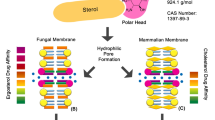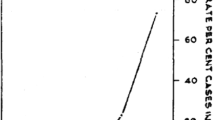Abstract
Chloroquine still remains the drug of choice for the treatment of malaria. Due to incipient resistance in P. falciparum to chloroquine, the dose of the drug has to be increased. Diagnosis of the species of parasite is thus important. In chloroquine resistant P. falciparum cases, long acting sulfonamide with pyrimethamine is at present capable of terminating acute P. falciparum infection. In cerebral malaria, where the susceptibility status of the parasite is not known, intravenous quinine is indicated. In situations where the transmission of malaria remains un-interrupted, suppressive chloroquine is not advocated. Personal prophylaxis is indicated. Caution is to be excercised in the use of primaquine which is a relatively toxic drug for the treatment of relapse of P. vivax cases where transmission of malaria remains uninterrupted. The random use of combination of long acting sulfonamide and pyrimethamine is discouraged.
Similar content being viewed by others
References
Bruce-Chwatt LJet al: Chemotherapy of malaria.WHO Monogr 27: 10, 1981
Bruce-Chwatt LJet al: Chemotherapy of malaria.WHO Monogr 27: 100, 1981
Coatney GR: Pitfalls in a discovery the chronicle of chloroquine.Am J Trop Med Hyg 12: 121, 1963
Choudhury DSet al: Response of plasmodium falciparum to chloroquine in Delhi, Sonepat, District of Haryana and Terai region of Uttar Pradesh.Indian J Mal 20: 63, 1983
Sharma V: Drug resistantP. falciparum malaria in India.Proc Indo-UK workshop on malaria. MRC, ICMR, 1983. p 169
Powell RDet al: Effect of glucose 6 phosphate dehydrogenase defficiency upon the host and upon host drug malaria parasite interaction.Military Med 131: 1039, 1966
Olsen VV, Loft S and Christensen K: Reaction during malaria prophlaxis with pyrimethamine-sulfadoxine.Lancet ii 994, 1982
Whitefield B: Presumptive fatality due to pyrimethamine-sulfadoxine.Lancet ii: 1272, 1982
Hornstein OP, Rupreeht KW: Fansider induced Stevens-Johnson syndrome.N Engl J Med 307: 1529, 1982
Author information
Authors and Affiliations
Rights and permissions
About this article
Cite this article
Choudhury, D.S. Treatment of malaria. Indian J Pediatr 52, 275–280 (1985). https://doi.org/10.1007/BF02754857
Issue Date:
DOI: https://doi.org/10.1007/BF02754857




